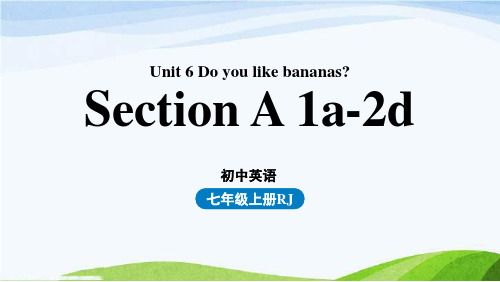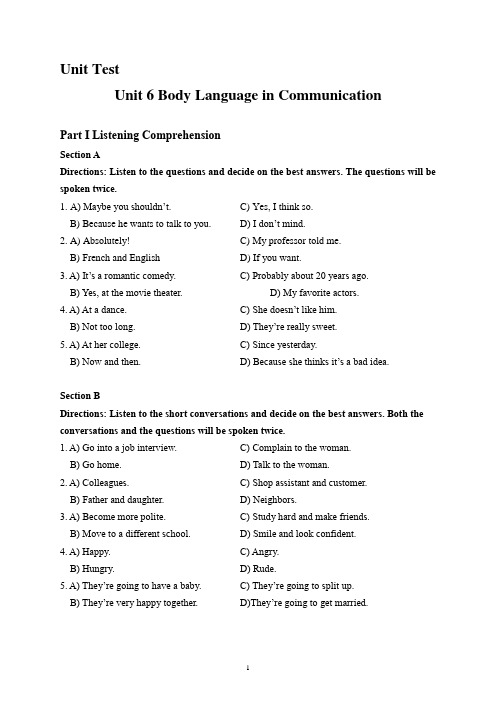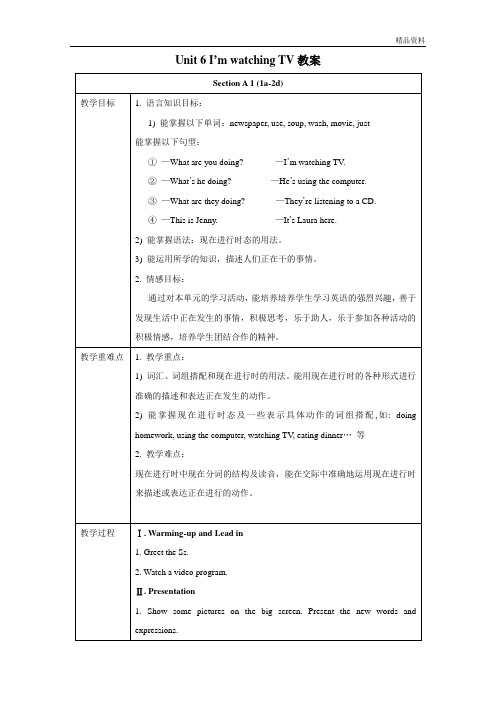Section I Unit 6
新人教英语七年级上Unit6第一课时 Section A1a-2d

I know a boy. His name is John. John’s birthday is next (中午或晚上吃的)正餐
week. So his friends are preparing for his birthday dinner. But they don’t want John to know it. 生日
Read the conversation in 2d and answer the question: What do they want to eat?
Jack: Hey, John’s birthday dinner is next week. Let’s think about the food. Tom: Sure. How about burgers, vegetable salad, and some fruit? Bill: Sounds good. John likes hamburgers. Jack: Oh, I don’t like salad. Bill: But John likes salad, and it’s his birthday. Jack: Yes, you’re right. What about the fruit?
2c Practice the conversations in 2b. Give answers that are true for you. Do a survey in groups of four and give a report.
I like tomatoes. Do you like tomatoes?
A: Do you like salad? B: No, I don’t. A: Do you like bananas? B: Yes, I do. A: Do you like oranges? B: Yes, I do.
2020学年高中英语Unit6DisasterandhopeSectionⅠStartingout

Ⅱ.Read the text carefully and choose the best answers according to the text. 1.What can we learn from the text? A.There is a volcano in London erupting now. B.The working place will move to the top floor. C.The author wants to sell his flat and buy a boat. D.The temperature in London is highegh 通过(考试等);接通电话;完成;用完 go through 获准,经过程序;通过;经历;详细检查 break through 冲破,突破 live through 经历
[能力提升]——完成句子 ①I must _l_o_o_k_t_h_r_o_u_g_h_ these bills and check them before I pay them. 我必须在付款前查看并核对一下这些账单。 ②The scientists hope__to__b_r_e_a_k_t_h_r_o_u_g_h__ soon in the research for a cure for cancer. 科学家们希望不久在研究癌症治愈方法方面会有突破。 ③I've been trying to phone Charles all evening, but there must be something wrong with the network; I can't seem _________to__g_e_t_t_h_r.ough 我一晚上都在打电话给Charles,但是网络肯定有问题,所以我不能接通。 ④With someone I love I can __g_o_t_h_r_o_u_g_h__all the hardships of life together. 和我爱的人在一起,我可以和他一起渡过生活中的一切难关。
2021_2022学年新教材高中英语UNIT6THEADMIRABLESectionⅠTopicTa

realize how close they were to success when they gave up. —Thomas Edison
很多人失败,是因为他们不知道他们放弃时,距离成功是多么的
近。
——托马斯·爱迪生
We do not admire the man of timid(胆怯的) peace.We admire the man who embodies victorious efforts,the man who never wrongs his neighbor, who is prompt to help a friend,but who has those virile qualities necessary to win in the stern strife of actual life.It is hard to fail,but it is worse never to have tried to succeed.In this life we get nothing save by effort.Freedom from effort in the present merely means that there has been effort stored up in the past.A man can be free from the necessity of work only by the fact that he or his fathers before him have worked to good purpose.
Qian Xuesen graduated from Shanghai Jiao Tong University in 1934.In 1935,he went to the United States for further study.In 1950,he heard that the new China had been founded,he began to try his best to go back to his motherland.Since 1958,Dr.Qian had devoted all his life to China's aerospace science and technology and made great achievements.He set up China's first missileandrocketresearch
外研社2023新视野英语教程(第四版)视听说教程1附答案Unit_6 测试卷

Unit TestUnit 6 Body Language in CommunicationPart I Listening ComprehensionSection ADirections: Listen to the questions and decide on the best answers. The questions will be spoken twice.1.A) Maybe you shouldn’t.C) Yes, I think so.B) Because he wants to talk to you. D) I don’t mind.2. A) Absolutely! C) My professor told me.B) French and English D) If you want.3. A) It’s a romantic comedy. C) Probably about 20 years ago.B) Yes, at the movie theater.D) My favorite actors.4. A) At a dance. C) She doesn’t like him.B) Not too long. D) They’re really sweet.5. A) At her college.C) Since yesterday.B) Now and then.D) Because she thinks it’s a bad idea.Section BDirections: Listen to the short conversations and decide on the best answers. Both the conversations and the questions will be spoken twice.1. A) Go into a job interview.C) Complain to the woman.B) Go home. D) Talk to the woman.2. A) Colleagues. C) Shop assistant and customer.B) Father and daughter. D) Neighbors.3. A) Become more polite.C) Study hard and make friends.B) Move to a different school. D) Smile and look confident.4. A) Happy. C) Angry.B) Hungry. D) Rude.5. A) They’re going to have a baby.C) They’re going to split up.B) They’re very happy together.D)They’re going to get married.Section CDirections: Listen to the short conversation and decide on the best answers. Both the conversation and the questions will be spoken twice.1. A) Leave Europe.C) Go to live in Europe.B) Travel around Europe.D) Study in Europe.2. A) Make lots of friends.C) Organize a travel schedule.B) Communicate clearly.D) Be aware of cultural differences.3. A) Stand close to them.C) Stand far away from them.B) Use your hands to communicate.D) Make eye contact.Section DDirections: Listen to the passage and fill in the blanks. The passage will be read three times.If you want to show that you are open to making new friends, you need to be very (1) _______ your body language and what it is saying about you. First, make sure you keep an open posture. This means keeping your (2) _______ and your shoulders back. Don’t fold or cross your arms across your body, as this puts (3) _______ between you and other people. Second, make (4) _______. This tells people that you are friendly and ready to chat to them. Third, don’t forget to smile, and make sure that you smile with (5) _______ and not just your mouth. This way, your smile will look real, and not fake. If you remember these three golden rules of body language, you will find it easy to make friends in new situations.Part II Speaking upDirections: Choose the correct words to complete the conversation. Then practice it with your partner.M: You know, I find it really hard to get on with some of my (1) workers/colleagues. I feel like we just don’t understand each other.W: Maybe you need to pay more (2) attention/notice to their body language.M:Do you really think so? I’d never (3) reflected/thought about that before.W: Well, you should! Your body language might be (4) communicating/communicate all kind of things without you even realizing it.M: Really? What (5) sort/kind of things are you talking about?W: How (6) interested/interesting you are in what you’re saying for one thing.M:I’m always interested in what my colleagues speak to me (7) on/about.W: But if you (8) lean/lend back in your chair, look away, or fidget with your fingers then your body language might be saying something very different.M: I (9) suppose/recommend I maybe do fidget a little. I won’t do that again.W: You should also (10) notice/attend what the body language of your colleagues is saying. Sometimes people say one thing, but their body language tells you another.M: That’s really interesting. I’m going to (11) pay/buy a lot of attention to body language from now on!W: I think you’ll find it really helps you to (12) make/build relationships at work.Unit 6 Body Language in Communication听力脚本Part I Listening ComprehensionSection ADirections:Listen to the questions and decide on the best answers. The questions will be spoken twice.Number one: Why is he making that hand signal?Number two: Do you think body language courses should be taught at university?Number three: When do you think this movie was made?Number four: How long do you think they’ve been together?Number five: Why is she shaking her head like that?Section BDirections: Listen to the short conversations and decide on the best answers. Both the conversations and the questions will be spoken twice.Number oneM: Do you think she likes me?W: Well, she keeps smiling at you. I think you should go and talk to her.Question: What is the man probably going to do?Number twoM: What do you think about the second candidate we interviewed?W: Hm, he didn’t really make very good eye contact. I think he seemed nervous. Question: What is the most likely relationship between the man and woman?Number threeW: I’m nervous about starting a new school. What if I don’t make any friends?M: Just smile and look confident. Everyone will love you.Question: What advice does the father give his daughter?Number fourM: Why does that old woman look so angry with me?W: I think the thumbs-up sign is considered rude here. You’ve probably offended her. Question: How is the old woman probably feeling?Number fiveM: Why do you think that Amy and Colin are going to split up?W: I don’t know for sure. But their body language doesn’t look great.Question: What does the woman think about Amy and Colin?Section CDirections: Listen to the short conversation and decide on the best answers. Both the conversation and the questions will be spoken twice.W: Is there anything I should know before I go traveling around Europe?M: Well, I would watch out for the little cultural differences between countries.W: What do you mean?M: Even within small geographical areas, people communicate very differently.W: Can you give me some examples?M: Well, in Spain you’ll find that people stand very close to you when they’re talking. And if you move away, they’ll think you’re unfriendly.W: Okay, got it. I’ll stand close to people when I’m talking to them.M: Not everywhere you go though! If you do that in Germany, for example, people won’t like it. They’ll think you’re in their personal space.W: Sounds like I have a lot to learn!Question oneWhat is the woman planning to do?Question twoWhat advice does the man give her?Question threeAccording to the man, what should you do when you are talking to Spanish people?Section DDirections: Listen to the passage and fill in the blanks. The passage will be read three times.If you want to show that you are open to making new friends, you need to be very aware of your body language and what it is saying about you. First, make sure you keep an open posture. This means keeping your head up and your shoulders back. Don’t fold or cross your arms across your body, as this puts a barrier between you and other people. Second, make eye contact. This tells people that you are friendly and ready to chat to them. Third, don’t forget to smile, and make sure that you smile with your eyes and not just your mouth. This way, your smile will look real, and not fake. If you remember these three golden rules of body language, you will find it easy to make friends in new situations.参考答案Part I Listening ComprehensionSection A1. B2. A3. C4. B5.DSection B1. D2. A3. D4. C5. CSection C1. B2. D3.ASection D1. aware of2. head up3. a barrier4. eye contact5. your eyesPart II Speaking up1.colleagues2. attention3. thought4. communicating5. kind6.interested7. about8. lean9. suppose10. notice11.pay 12. build。
【最新】人教版七年级英语下册Unit 6 I’m watching TV Section A 1 (1a-2d)教案

3. Give Ss some time and try to remember the new words and expressions.
4.(Show some pictures on the screen and ask some students to perform the actions.)
②—Whatare they doing?—They arelisteningto a CD.
③—Is hereadinga newspaper?—Yes, he is./No, he isn’t.
④—Are they using the computer?—Yes, they are./ No, they aren’t.
(At half past six.)
2. Ss read theconversationand answer the questions above.
3. Check the answers with the Ss.
4. Let Ss work in pairs and role-play the conversation.
教学重难点
1.教学重点:
1)词汇、词组搭配和现在进行时的用法。能用现在进行时的各种形式进行准确的描述和表达正在发生的动作。
2)能掌握现在进行时态及一些表示具体动作的词组搭配,如:doing homework,using the computer,watching TV, eating dinner…等
5. Work on1a. Ss read the activities and look at the pictures. Then match the activities with pictures.
初中英语仁爱版八年级下册Unit6Topic1课文同步知识点整理

八年级英语下册Unit6Topic1课文同步知识点A1.some exciting news 一些令人兴奋的消息2.spring field trip 春游3.go on a trip 去旅行 go on a visit to +地点go on a three-day trip.进行为期三天的旅行:连字符内无“s",连字符具有形容词性质,置于名词前作定语。
因此”a" 不能省略。
4.It takes sb.st.to do sth.做某事花某人多长时间。
It 为形式主语,to do sth.为真正主语。
5.too...to...结构 too+adj./adv.to do 太....而不能The little boy is too young to take care of himself.小男孩太小不能照顾自己。
6.find out 查明:通过调查、研究或询问等方式获取某种信息或事实。
7.cost n.价钱,费用;v.价钱为,需花费 the cost of sth.指某项活动、产品或服务的花费。
8.bring 带来 bring in 引进 take 带走9.decide on sth.决定,在多个选项中做出选择决策。
10.the best way to do 做某事的最佳方式、方法。
11.start out 出发,动身B1. book n.书 v.预定 book the train tickets 预定火车票2. railway <英>铁路,铁道;railway station 火车站; highway n.公路;高速公路; subway n.<美>地铁;underground n.<英> 地铁3.对某物的价钱进行提问时有三种表达1>How much is the red pen? 那支红色的笔多少钱?2> What's the price(价格)of the red pen? 那只红色的笔价钱是多少?3> How much do you charge for(收费)the red pen? 那只红色的钢笔你要多少钱?4.hard adj.硬的,hardsleeper 硬卧 hardware 硬件adj.困难的 hard time困难时期adv.努力地 work hard 努力工作soft adj.柔软的 feel soft 感觉柔软 software 软件 soft music 轻音乐5.花费1> 花费时间takeIt takes 某人 sometime to do 某事.——做某事花费某人多长时间spend某人 spend sometime (in) doing 某事——某人花多长时间做某事2>花钱pay for某人 pay some money for 某物——某人为某物支付多少钱cost某物 cost 某人 some money——某物花费了某人多少钱spend某人 spend some money on 某物——某人在某物上面花了多少钱C1.raise v.举起;(人为)增加,提高;筹募,征集;饲养;抚养;(为...) 筹集资金 raise money(for) =collect money (for)抚养孩子 raise a child提出问题 raise a question2.lucky money 红包,压岁钱 pocket money 零花钱3.borrow sth.from sb./sw.从某人或某处借来某物 lend sth.to sb.把某物借出给某人return sth.to sb./sw.把某物归还某人或某地4.ask sb.for sth.向某人索要/寻求某物 eg.ask sb.for help 向某人寻求帮助5.give v.给,交给 give sb.sth.捐赠;give away表演,公开进行;give/put on a show演出 give a speech 做演讲给(某人)打(电话) give sb.a call让步,妥协 give in 放弃 give up6.way n.方法,手段;行为方式;道路,路线;距离the way to do sth.做某事的方式、方法on one's way to sw.在某人通往某地的路上7.draw v.draw-drew-drawn画,绘画;draw a picture吸引,使注意;draw one's attention获得,得到;推断出;draw a conclusion 得出结论抽出,吸出;drawer 抽屉(从银行账户)取出;draw money ;withdraw 提取抽签,抓阄;draw lots8.with 复合结构做定语The student with the winning ticket will be the king or queen for the next school day.拥有胜出票的学生将成为下一个学校日的“王”或“后”9.order n.& v.顺序,次序;put ...in the right order条理;秩序 keep order 维持秩序;命令,指示;order sb.to do 命令某人去做点餐,订购;take one's order10.serve v.为……工作,服役;serve as 充当,担任端上,给……提供(餐饮);serve a special lunch to the student 为该生奉上一顿特制午餐对……有用,满足;serve the needs of符合……的需要11.go on a spring field trip 去春游12.the best time to do sth.做某事的最佳时间 the best way to do sth.做某事的最佳途径13.decide v.做决定 decide to do decision n.决定 make a decision14.advise v.建议 advise sb.to do 建议某人做某事=suggest sb.doing; advice n.意见ask sb.for advice 向某人询问意见15.hear v.听到,听说(结果)与listen(听,瞬间动作)和sound(听起来,系动词)不同hear of 听说:意指知道(某人或某事)的存在;了解(某人或某事)hear about 听说某事听到关于某事物的消息hear from 收到某人的来信/来电等:指从某人那里收到一封信、一个电话等。
Unit6__Topic1__SectionA__参考教案

Unit6 Topic1 SectionA 参考教案Ⅰ. Material analysis本节课为该话题的第一节课,建议用1课时上完。
主要活动为SectionA的1a和3。
本单元教学内容主要围绕旅游和交通方面的话题展开。
话题一主要让学生学习如何用英语谈论旅游,如何用英语预订车票、房间,如何为旅游筹集资金、制订出行计划等。
动词不定式是本话题的重点语法项目。
本课通过让学生掌握旅游地点、交通方式和所需费用等常识,掌握黑体单词和短语field, proper,total, go on a visit to … 和decide on…, 理解白体词汇mount, vehicle, airline, partner和suitable, 掌握动词不定式的用法,同时教育学生要学会制订计划;培养学生热爱旅游、积极探索的态度。
Ⅱ. Teaching aimsKnowledge aims:1. 学生能正确拼读并运用黑体单词。
2. 学生能正确运用以下短语造句:go on a visit to …, make a decision, too…to…和decide on…3. 学生能自如地运用以下句式进行交流:I have some exciting news to tell you.We’re going on a three-day visit to Mount Tai.It will take us a few days to get there by bike.It costs …Let’s decide.We’ll decide on the best way to travel on our fie ld trip.4. 学生能简单地掌握动词不定式的用法。
Skill aims:1. 能听懂有关旅游的短文或对话,并从中获取信息。
2. 能使用英语与他人谈论关于旅游的话题。
3. 能理解有关旅游、预订等方面的叙述,并从中获取需要的信息。
unit6 nurturing nature sectionⅰ

最先映入眼帘的地标性建筑是壮观的清水河 大桥,它是世界上最长的高原冻土铁路桥。
⑤ leisure :time that is spent doing what you enjoy when you are not working or studying 3.词汇拓展 ① steadily /'stedɪli/adv.平稳地→steady /ˈstedi/adj.稳定的;沉稳的 v.使平 稳;稳住 adv.稳定地;持续地 ② massive /ˈmæsɪv/adj.巨大的→mass/mæs/n.大量;块,团 v.集结;聚集 ③ delicate /ˈdelɪkɪt/adj.脆弱的→delicately/ˈdelɪkətli/adv.微妙地; 精致地;优美地
bridges with a total length of about 160 kilometres were built between
Golmud and Lhasa.
8. Located at over 5,000 metres above sea level, Tanggula
Station is the highest railway station in the world.
A twenty-kilometre wall along Cuona Lake was built to protect it
9. from
construction waste.
- 1、下载文档前请自行甄别文档内容的完整性,平台不提供额外的编辑、内容补充、找答案等附加服务。
- 2、"仅部分预览"的文档,不可在线预览部分如存在完整性等问题,可反馈申请退款(可完整预览的文档不适用该条件!)。
- 3、如文档侵犯您的权益,请联系客服反馈,我们会尽快为您处理(人工客服工作时间:9:00-18:30)。
Dialogue 2
Saleswoman: Good afternoon, sir. May I help you? Ted: Yes. I‟d like to see the tie in the showcase. Saleswoman: Which one, sir? Ted: The green one. Saleswoman: This one? Ted: Yes, that one. Is it pure silk? Saleswoman: Yes, sir, pure silk and hand-made. Ted: How much it is? Saleswoman: Eighty yuan, sir. Ted: I‟m afraid it doesn‟t fit me very well. Have you got any other ones? Saleswoman: How about this one?It‟s 55 yuan. Ted: The price is all right, but it‟s a bit showy, isn‟t it? Saleswoman: Oh, I don‟t think so, sir. I think it suits you well. Ted: Then I‟ll take it. Saleswoman: Thank you, sir. Will you wait a moment please?I‟ll have it wrapped.
Dialogue 6.
Mr. Allen: I‟m afraid your prices are much too high. Mr. Lu: Well, we can consider making some concessions in our price. But first, you‟ll have to give me an idea of the quantity you wish to order from us, so that we may adjust our prices accordingly. Mr. Allen: The size of our order depends greatly on the prices. Let‟s settle that matter first. Mr. Lu: Well, as I‟ve said, if your order is large enough, we‟re ready to reduce our prices by 3 percent. Mr. Allen: When I say your prices are much too high, I don‟t mean they are higher merely by 2 or 3 percent. Mr. Lu: How much do you mean then? Can you give me a rough idea? Mr. Allen: To get this business done, I should say a reduction of least 10 percent would help. Mr. Lu: Impossible. How can you expect us to make a reduction to that extent? Mr. Allen: I think you are well-informed about the market. The supply of this product exceeds demand at present. Well, may I suggest that you call your home office and see what they have to say? Mr. Lu: Very well, I will.
Dialogue 4
Salesman: Good afternoon. Is there anything I can do for you? Woman: Yes. Do you have sandals to match this skirt? Salesman: Yes. We have quite a few different colors. And do you want high heeled or flat ones? Woman: High, please. Salesman: Do you like the red ones? Woman: Yes. They‟re very nice. Salesman: Please try them on. Woman: They are a bit too large. Salesman: How about this one? Woman: They fit well. How much are they? Salesman: Eighty five dollars. Woman: Oh, they are too expensive. Any discount? Salesman: We can give you 5﹪discount. Woman: All right. I‟ll take it.
Dialogue 5
Salesman: May I help you? Woman: Yes. I would like to return these trousers. Salesman: Alright. Do you have your receipt? Woman: Yes. Here it is. I bought them last week. Salesman: And why are you returning them? Woman: I bought them to go with a blouse of mine. But they don‟t really match. Salesman: Shall I show you some other colors? Woman: Sorry, I just want to return it. Salesman: No problem. Show me the receipt, please. Woman: Here you are. Salesman: Here‟s your money. I need you to sign your name here. Woman: OK, thank you very much.
A: Yes. I often go shopping on weekend. / I go shopping twice a month/I
often spend one hour to buy things I want…
B: No, I don’t like to go shopping, because…
Warm-up Activities
I. Read the following words and find the pronunciation rule for letter “-s”or “-es” .
1. [s] months 2. [z] plays 3. [is] brushes 4. [ts] cats 5. [dz] birds truths bars catches nuts grades grapes smells buses suggests sends roofs apples places baskets sounds ducks congratulations chances sheets beds
Dialogues
Dialogue 1
Greengrocer: What can I do for you, Madam? Woman: I‟d like a kilo of apples, half a kilo of grapes, and a kilo of mangos. Greengrocer: There you are. A kilo of apples, half a kilo of grapes, and a kilo of mangos. Anything else? The bananas are sweet and cheap these days. Woman: OK, give me five bananas please. Greengrocer: What about these ones? Woman: Yes, I‟ll take them. Greengrocer: Nineteen dollars fifty cents all together.
II. Read the story below and pay attention to your pronunciation and intonation.
A young man was walking in a supermarket to buy some stuff when he noticed an old lady following him around. Thinking nothing of it, he ignored her and continued on. Finally he went to the checkout line, but she got in front of him. “Pardon me,” she said, “I‟m sorry if my staring at you has made you feel uncomfortable. It‟s just that you look just like my son, who just died a few days ago.” “I‟m very sorry to hear that,” replied the young man, “Is there anything I can do for you? “Yes,” she said, “as I‟m leaving, can you say „Good bye, Mom!‟? It would make me feel so much better.” “Sure,” answered the young man. As the old woman was leaving, he called out, “Goodbye, Mom!” As he stepped up to the checkout counter, he saw that his total was $136. “How can that be?” he asked, “I only purchased a few things!” “Your mother said that you would pay for her,” said the cashier.
